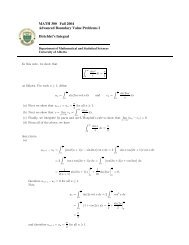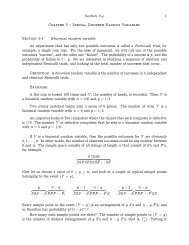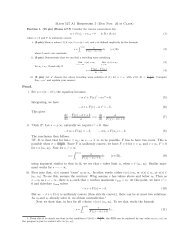Math 411: Honours Complex Variables - University of Alberta
Math 411: Honours Complex Variables - University of Alberta
Math 411: Honours Complex Variables - University of Alberta
Create successful ePaper yourself
Turn your PDF publications into a flip-book with our unique Google optimized e-Paper software.
92CHAPTER13. FUNCTIONTHEORETICCONSEQUENCESOFTHERESIDUETHEOREM<br />
Pro<strong>of</strong>. Suppose that f is not constant. Let z0 ∈ D be arbitrary, and define<br />
gn: D \{z0} → C, z ↦→ fn(z)−fn(z0)<br />
for n ∈ N. Then g1,g2,... have no zeros. Since f is not constant, the function<br />
D \{z0} → C, z ↦→ f(z)−f(z0)<br />
is not zero, so that it has no zeros by Hurwitz’s theorem, i.e. f(z) �= f(z0) for all<br />
z ∈ D, z �= z0.<br />
Theorem 13.5 (Rouché’s Theorem). Let D ⊂ C be open and simply connected, and<br />
let f,g : D → C be holomorphic. Suppose that γ is a closed curve in D such that<br />
intγ = {z ∈ D \{γ} : ν(γ,z) = 1} and that<br />
|f(ζ)−g(ζ)|< |f(ζ)|<br />
for ζ ∈ {γ}. Then f and g have the same number <strong>of</strong> zeros in intγ (counting multiplicity).<br />
Pro<strong>of</strong>. For t ∈ [0,1], define ht := f +t(g−f), so that h0 = f and h1 = g. Also, since<br />
|t(g −f)|≤ |g −f|< |f|<br />
for any t ∈ [0,1] on {γ}, the functions ht have no zeros on {γ}. For t ∈ [0,1], let<br />
n(t) ∈ N0 denote the number <strong>of</strong> zeros <strong>of</strong> ht in intγ. Since the functions ht have no<br />
poles in D, we know from the Argument Principle that<br />
n(t) = 1<br />
2πi<br />
�<br />
γ<br />
h ′ t(ζ) 1<br />
dζ =<br />
ht(ζ) 2πi<br />
�<br />
γ<br />
f ′ (ζ)+t(g ′ (ζ)−f ′ (ζ))<br />
f(ζ)+t(g(ζ)−f(ζ)) dζ.<br />
We thus see that n(t) is a continuous function <strong>of</strong> t. But since n(t) can only taken on<br />
integer values, it must be constant on [0,1]; in particular, n(0) = n(1).<br />
Example. How many zeros does z 4 −4z +2 have in D?<br />
Set<br />
g(z) := z 4 −4z +2 and f(z) = −4z +2.<br />
For ζ ∈ ∂D, we have |f(ζ)|≥ |−4z|−2 = 4−2 = 2, so that<br />
|f(ζ)−g(ζ)|= |ζ 4 |= 1 < 2 ≤ |f(ζ)|.<br />
Since f has precisely one zero in D, so does g.<br />
Corollary 13.5.1 (Fundamental Theorem <strong>of</strong> Algebra). Let p be a polynomial with<br />
n := degp ≥ 1. Then p has n zeros (counting multiplicity).







